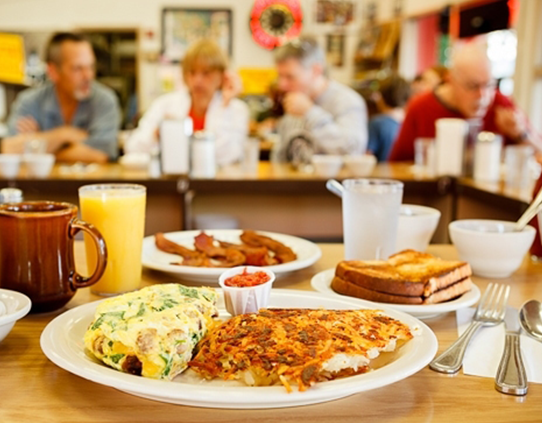GALUPSY, HALUPKI, golabki, golumpki: No matter what you call them, cabbage rolls are a welcome sight when the weather gets cooler.
Meaning "little pigeons," the dish likely originated in the Mediterranean with the rice-stuffed grape leaves called dolmas, but they were also made in France as chou farci. They were first introduced to Eastern Europe during a widespread craze for French cuisine in the late 1700s spurred by it-girl Catherine the Great who was a major Francophile. Cabbage replaced the grape leaves, and beef replaced the ground lamb. Vegetarian versions made with wild mushrooms were also common in Eastern Europe during Lent and on fasting days, but are oddly absent from Portland's selection.
They can be made fairly easily at home, but if you don't want to bother, you're in luck: I tried pretty much every cabbage roll in town*—just for you.
Traditional Russian Cuisine
This diminutive cart at the pod on SE 102nd and Stark is worth the schlep to the hinterlands. Their golubcy (two for $7) are so ethereal that it's possible to eat approximately 30 of them. The dill-flecked filling centers on rice and shredded carrots, with the seasoned ground meat taking a backseat. The thin tomato sauce is light in flavor, but ask for sour cream and you'll also get fresh dill and sliced scallions. SE 102nd & Stark
Roman Russian Market
Golubcy are available as a to-go item from Roman Russian Market's deli case ($6.80/pound; they run about $1.60 each). You have to warm them up when you get them home. These are a little on the salty side, the rice (fluffed up with shredded carrot and minced onion) is pretty soft, and there wasn't much meat. They definitely benefit from the addition of sour cream. Out of all the rolls I tried, these were probably my least favorite—but I still love this store and can't stay mad at them. 10918 SE Division
St. John the Baptist Ukrainian Orthodox Church
Only available on Saturdays from 11 am-2 pm, the cabbage rolls served in the basement of the Ukrainian Orthodox Church are no joke. They're lovingly cranked out by church ladies who will chat with you about the old country and compliment your Russian-speaking abilities. The cabbage in these is a little more toothsome, which was a nice change from the others. They're a little on the small side, like two bites each, and as with all things, are improved by sour cream. Unfortunately, they only sell them frozen ($6/pound; comes out to about a buck apiece), but they reheat nicely in the oven or microwave. 8014 SE 16th
Euro Dish
This Polish-centric cart features serviceable cabbage rolls (golabki) as part of their sampler, or you can order them à la carte for $3.50 each. They come dressed in a generous swabbing of tomato sauce, stuffed with rice, a little ground beef, and do I detect a bit of buckwheat? Although the curly parsley garnish offers a bit of minerality to balance the rich interior, the few pieces of chopped lettuce they toss on top seem a little silly. They're a pretty good size, so one or two should have you all set. SW 10th & Alder
Der Rheinlander
The cabbage rolls at Der Rheinlander are available as an entrée ($13.75) or an appetizer ($7.95). Also called Krautrouladen, the German iteration of the dish eschews the tomato sauce for a beefy demi-glace with finely minced carrot, onion, and celery, and a dense filling dominated by meat rather than rice. Der Rheinlander's cabbage rolls are very hearty, and although the gravy is on the salty side (it tasted a bit of Knorr), this is a problem easily solved with beer. 5035 NE Sandy
Kachka
I know this is going to sound chintzy, but at $17, the cabbage rolls (golubtsi) at Kachka are fucking expensive—especially for peasant food. However, they come two to a plate, and are tender and quite meaty, subbing out ground beef for pork. They are swimming in a zippy, sweet-and-sour tomato sauce—an interesting Jewish influence missing from the city's other rolls—with a dollop of sour cream and a few pinches of dill. So yeah, they're delicious, but for this price, they'd better be. 720 SE Grand
*I know it might be a little confusing, but I've included each business' spelling for their cabbage roll. Also note: Since I'm not a member of the Polish Library Building Association, I couldn't try the $6 goabki at Grandpa's Café inside the Polish Hall (3832 N Interstate). Naturally, these forbidden fruits are the most alluring of all. If you've got Polish ancestry, you can get a $1 one-day guest membership to enter the café!



















